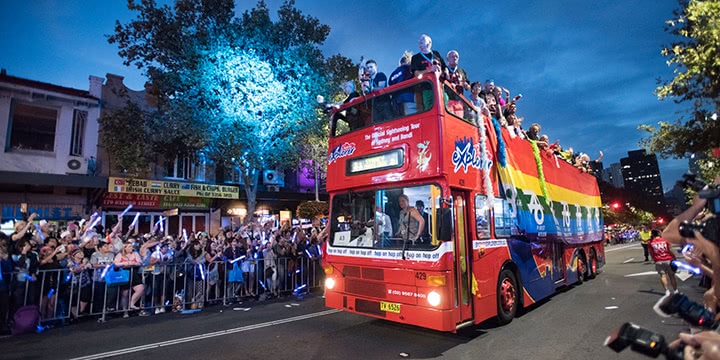Last week, the ABC published a story about the transgender sister girls of the Tiwi Islands.
I’d read stories about these women before, but this one took my interest because they have expressed their desire to one day attend the Sydney Gay and Lesbian Mardi Gras.
Since coming out, I’ve taken Mardi Gras for granted – it’s there, every year, in my home city. Sometimes I go to the parade, sometimes I skip it to prepare for the afterparty. But it’s always there, an extension of my city and my home.
I’ve always thought that being happy and queer is really only possible in cities. The urban ‘anything goes’ environment provides the breeding ground for experimentation and weirdos.
But I now realise this perspective is so distinctly white and colonised. After watching the video of the sister girls on Tiwi, it’s glowingly apparent that while the city might be my place to be me, it’s not the same for everyone.
When I look at the way the Western world has been heading backwards in terms of LGBT rights, particularly in places like the US (did you know that among repealing same sex marriage and a bunch of other horrid anti-LGBT policies, the 2016 Republican platform officially supports gay conversion therapy, the archaic and often illegal practice of trying to turn gay people straight?), it becomes pretty clear that we need to look to other models of LGBT progress.
In particular places, queerphobia is a product of colonisation. It was Western society (and Judeo-Christian religions) that introduced this rigid notion of gender, family, and therefore sexuality, and imposed it on the world. One only has to look at the culture of brother boys and sister girls in indigenous Australia, two-spirit people in North America, bakla people in the Philippines, and countless others to see the way other cultures have always queered these ideas of gender and family, allowing queerness to thrive in more than just the sidelines of society.
Meanwhile, white colonisation has created a world where queer people are only free to be themselves in the unruly environment of the urban, while at the same time establishing a particular, singular narrative of fleeing the rural to the urban queer oasis.
While I’d like to think the sister girls of the Tiwi Islands would be welcomed with open arms by Sydney’s queer community, the fact is the rest of the city might not be so tolerant – and more importantly, the city simply isn’t their home, their place.
The sister girls have a very different relationship to the land and their queerness than I do. Perhaps the standout point this story reminded me of is that there are so many more ways to do queer than living in Newtown.
That these women want to come to Mardi Gras is what drove this home to me. I realised I had no idea what Mardi Gras – a celebration that, while only occurring once a year, lives with me most of the year in my urban world – would mean to people from such a sparsely populated remote indigenous community, who definitely don’t see the city as the heart of their community. What would a parade that celebrates Sydney almost as much as it celebrates queerness mean to a group of women who don’t desire an urban environment in the way that I do?
I’m keen to find out, which is why I want to help get the sister girls of the Tiwi Islands get to Mardi Gras next year, so they can experience it, and so we may learn that being queer isn’t simply a white, urban phenomenon.
[The First Nations float at the Sydney Gary and Lesbian Mardi Gras 2015, photo by Ashley Mar]
This Week:
This Wednesday July 27,Queerbourhood returns to The Bearded Tit with a Peaches tribute evening, hosted by Seymour Butz and friends. There’ll be Peaches-themed drinks, as well as music and performances.
Also on Wednesday July 27 at Slyfox, Birdcage collaborates with Alloutto bring you a ’90s party featuring Sveta, Tiny and more.
On Saturday July 30, don’t miss L’Oasis’ first birthday party. Buy your tickets early as there are no door sales, and the location will only be made known to ticketholders. The night features Baron Castle, Rohan Willard, Luke O’Connor and Mercedes.
Saturday July 30 also sees another secret location party, this time by Vibe Positive, featuring Nite Fleit, Andy Garvey, Valerie Yum and more.
As if you needed more choice on Saturday July 30, The Red Rattler is hosting a listening party – a monthly safe space event showcasing female and LGBTQIA+ artists. This edition is with Melbourne artists Simona Castricum and Shag Planet, as well as locals Hip Hop Hoe and Sass Hound.

































